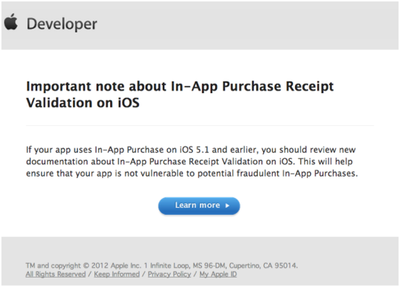In-App Purchase Vulnerability to Be Fixed in iOS 6; Apple Offers Best Practices to Developers
As noticed by 9to5Mac, Apple has offered developers a series of best practices to prevent the In-App Purchase vulnerability, as well as promising a full fix in iOS 6. The advisement was sent to developers in an email today.

CNET was issued this statement by Apple:
"We recommend developers follow best practices at developer.apple.com to help ensure they are not vulnerable to fraudulent In-App purchases," Apple spokesperson Tom Neumayr told CNET. "This will also be addressed with iOS 6."
Apple issued this note to developers on the iOS Developer webpage, along with a series of suggestions to help verify that in-app purchases are legitimate:
A vulnerability has been discovered in iOS 5.1 and earlier related to validating in-app purchase receipts by connecting to the App Store server directly from an iOS device. An attacker can alter the DNS table to redirect these requests to a server controlled by the attacker. Using a certificate authority controlled by the attacker and installed on the device by the user, the attacker can issue a SSL certificate that fraudulently identifies the attacker’s server as an App Store server. When this fraudulent server is asked to validate an invalid receipt, it responds as if the receipt were valid.
News of the in-app purchase hack broke a week ago, and Apple has made several attempts to prevent users using the hack. It allows users to avoid paying for in-app purchases by using a third-party server as a "man-in-the-middle" attack. Apple now includes the UDID identifier in in-app purchase receipts in an attempt to increase the security of purchases.
Popular Stories
Despite being more than two years old, Apple's AirPods Pro 2 still dominate the premium wireless‑earbud space, thanks to a potent mix of top‑tier audio, class‑leading noise cancellation, and Apple's habit of delivering major new features through software updates. With AirPods Pro 3 widely expected to arrive in 2025, prospective buyers now face a familiar dilemma: snap up the proven...
Apple plans to release an all-new super thin iPhone this year, debuting it alongside the iPhone 17, iPhone 17 Pro, and iPhone 17 Pro Max. We've seen pictures of dummy models, cases, and renders with the design, but Lewis Hilsenteger of Unbox Therapy today showed off newer dummy models that give us a better idea of just how thin the "iPhone 17 Air" will be.
The iPhone 17 Air is expected to be ...
If you missed the video showing dummy models of Apple's all-new super thin iPhone 17 Air that's expected later this year, Sonny Dickson this morning shared some further images of the device in close alignment with the other dummy models in the iPhone 17 lineup, indicating just how thin it is likely to be in comparison.
The iPhone 17 Air is expected to be around 5.5mm thick – with a thicker ...
A developer has demonstrated Windows 11 ARM running on an M2 iPad Air using emulation, which has become much easier since the EU's Digital Markets Act (DMA) regulations came into effect.
As spotted by Windows Latest, NTDev shared an instance of the emulation on social media and posted a video on YouTube (embedded below) demonstrating it in action. The achievement relies on new EU regulatory...
Apple's iPhone development roadmap runs several years into the future and the company is continually working with suppliers on several successive iPhone models simultaneously, which is why we often get rumored features months ahead of launch. The iPhone 17 series is no different, and we already have a good idea of what to expect from Apple's 2025 smartphone lineup.
If you skipped the iPhone...
Apple seeded the third beta of iOS 18.5 to developers today, and so far the software update includes only a few minor changes.
The changes are in the Mail and Settings apps.
In the Mail app, you can now easily turn off contact photos directly within the app, by tapping on the circle with three dots in the top-right corner.
In the Settings app, AppleCare+ coverage information is more...
While the iPhone 17 Pro and iPhone 17 Pro Max are not expected to launch until September, there are already plenty of rumors about the devices.
Below, we recap key changes rumored for the iPhone 17 Pro models as of April 2025:
Aluminum frame: iPhone 17 Pro models are rumored to have an aluminum frame, whereas the iPhone 15 Pro and iPhone 16 Pro models have a titanium frame, and the iPhone ...






















